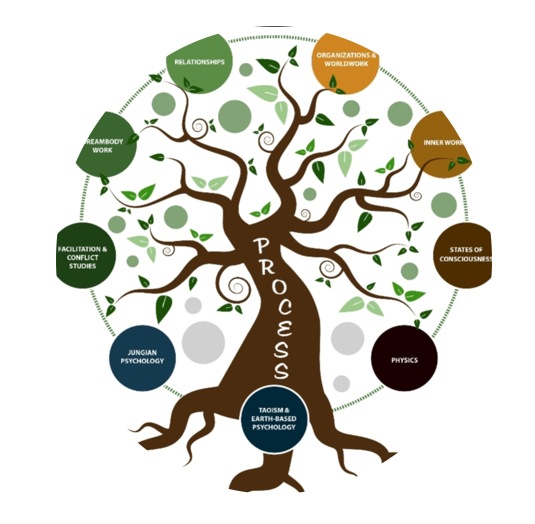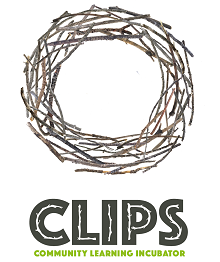Purpose and background

Process Work has its philosophical roots in shamanism, alchemy, Taoism, Quantum Physics, and Jungian psychology.
It took off as therapeutic work and has developed into group work and as a method for working with organizational development and leadership.
Process Work is a process-orientated, cross disciplinary approach to individual and collective change, pioneered and developed over the last 25 years by Dr. Arnold and Amy Mindell, and their colleagues.
Process Work methods are applied to a wide range of situations, including working with individual dreams, body and symptom work, mental health issues, altered states, illness and coma, relationships and families, teamwork and organizational development as well as with large groups and community forums.
Deep Democracy is one of the central pillars of Process Work. Deep Democracy is a philosophy and a feeling attitude. It refers to recognizing the wisdom or direction that arises out of the interaction of all parts, points of view, feelings, and dimensions of experience. For a group or community to be whole, all parts of the system need the opportunity to express themselves and interact. Deep Democracy means including experiences that are often marginalized from group life, and including all levels — Consensus Reality, Dreamland, and the Essence level.
Mindell describes deep democracy in the following terms. “For organizations, communities, and nations to succeed today and survive tomorrow, they must be deeply democratic – that is, everyone and every feeling must be represented. Deep democracy is awareness of the diversity of people, roles, and feelings about issues. When we are asked to become aware of and value our deepest inner experiences, almost any group or world situation becomes immediately different and manageable”. (Mindell, 2002).
Brief Example of the Process:
Process Work has not one single application; its use depends on the context, on the metaskills of the facilitator, on the need of the group or individual. It observes reality from three different levels:
Consensus reality: Refers to the outer situation, the facts and figures surrounding an issue,
dynamics of power, rank and privilege, economics and human rights, perceptions, laws, and policies.
Dreamland: Refers to the underlying patterns: roles and polarizations in a field – including the deep feelings behind the various positions people take. It includes ghost roles, those figures which are being spoken about but not represented.
Essence: This level precedes polarizations, or is the level where polarizations dissolve. It is an experience of subtle feelings and intuitions that can barely be caught and not yet verbalized. It is often felt as a sense of unity.
The methodology helps to move through these different levels of reality by exploring it and unfolding it through different channels:
- Auditory channel: content, words, sounds, etc.
- Visual channel: flirts, images, dreams etc.
- Kinaesthetic channel: movement, postures, subtle movement tendencies of the body etc.
- Proprioceptive channel: sensations, temperature, pressure.
- Relationship channel: communication, feelings, reactions.
- World channel: Events, happenings, signals coming from the surroundings, from the world.
Process Work helps to raise awareness about power, rank or privileges; the roles, structural or subtle/emotional, we take upon ourselves in groups, families, society; roles that are given to us; the way we use our power with, or over others and over ourselves; it supports us in developing a deeper attention and stronger awareness of ourselves and our surroundings.
Process Work can assist to look at and transform conflict through different phases:
Phase I: The tendency to avoid or marginalize problems. We want to be happy and forgetthe troubles.
Phase II: The phase of tension and conflict. There is the need to take a strong stand, to express our position.
Phase III: The phase where role switching and better communication with our opponent becomes possible.
Phase IV: The phase of detachment and relaxation. We go to the Essence level of experience.
None of the phases are better than the other. Process Work values all of them. Nevertheless, it is important not to get stuck in one. Moving fluidly through them is the key. When facilitating individuals, small or large groups, we are facilitating an underlying “field” that is expressing itself through us. Through our feelings and experiences, we are channels for the field.
Worldwork is a small and large group Process Work method that uses Deep Democracy to
address the issues of groups and organizations of all kinds. Worldwork describes Process Work in groups and community forums, dealing with a range of social and political issues. The group discovers which issue has the most energy behind it and reaches a consensus to focus on it.
The group then discovers what polarities, positions and roles are present in the group field, and represents them. A space may be set for these roles to interact and individuals go in and out of them. Tense moments, temporary resolutions, role switches, style of communication etc. are some of the tools used to frame and facilitate the group process.
Outcomes / Benefits, Influence on the 4 layers of CLIPS:
Process Work touches all the different layers of the CLIPS model. Thanks to the deep work in raising personal awareness, it assists individuals to become fully aware of their needs, how they bring it into the group; their ability to recognize personal traumas and difficulties; their ability to see the bigger picture and not just the personal opinion or needs.
It helps the group or community to better feel and identify its identity; to work on communication styles; to work on relationship issues; also, on couples and intimacy.
It helps the group and individuals to identify their personal goals; their position in the group and in society and allows the individual to choose his/her intention beyond “right and wrong”, beyond those cultural belief systems that often influence our choices.
Finally, it helps to shed light to leadership and power issues; it helps to identify structural and subtle/invisible roles; it supports the emergence of all voices and opinions in a group/family helping us to make decisions that can really be supported by everyone and that reflect the needs of the entire field.
What is needed to put it in practice?
Amy Mindell coined the term “meta-skill” to describe the feeling attitude of the facilitator, and the importance of the feeling attitudes with which one uses one’s techniques. It is important for the facilitator to remember that what one sees in the overt behavior of the group is only part of the total field. To do inner work is a prerequisite. Without the ability to process our own complexes and conflicts on the spot, we are likely to contribute more to the problem than its momentary resolution. A deep training in Process Work and several personal sessions and adequate supervision will be necessary in order to accompany a group in safety. As such, we use Deep Democracy and Process Work as a source, as a field of inspiration to tap into, while we seek experienced trainers and facilitators of Process Work, when applying the methods.
Further Information - Possibilities to get training in the approach.
Process Work requires deep training and deep personal work. There are several international schools in Europe and worldwide that provide such trainings. The most updated webpage with these training centres can be found at: http://www.iapop.com or http://www.aamindell.net.
The training generally consists of a first phase of around 4 years during which the individual learns the method, works on his/herself through personal therapy sessions and through supervision on the work he/she carries out with groups. In the second phase, which then leads to the international diploma in Process Oriented Psychology, the student has to undergo deeper supervision and mentoring on the work carried out with groups or single clients.
The scope of this deep study path is to make the facilitator aware of his/her own reactions to matters emerging from the clients; to develop his/her meta-skills to maintain his/her centre even during the most difficult facilitation cases.
Some schools also provide a facilitation certificate after phase I.

